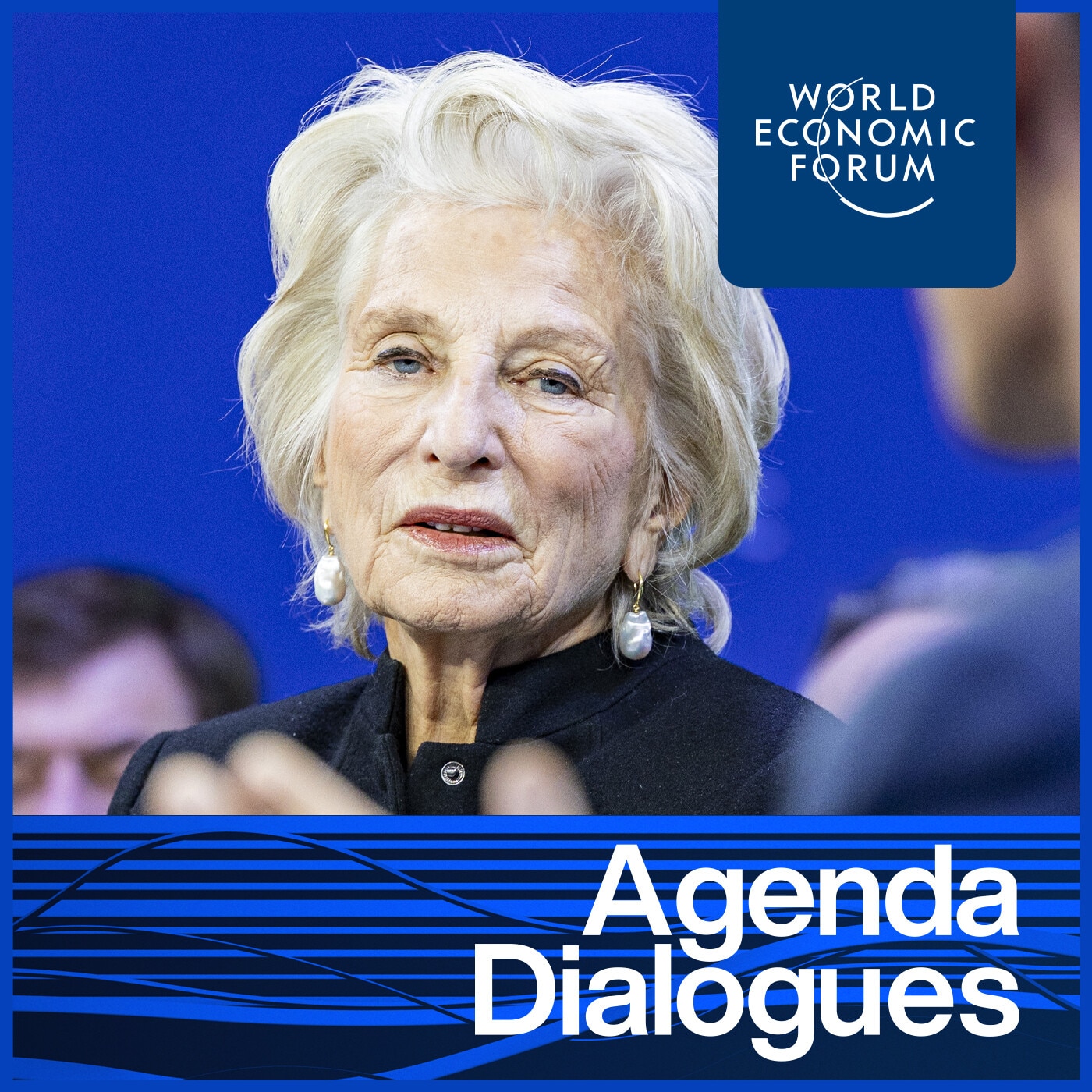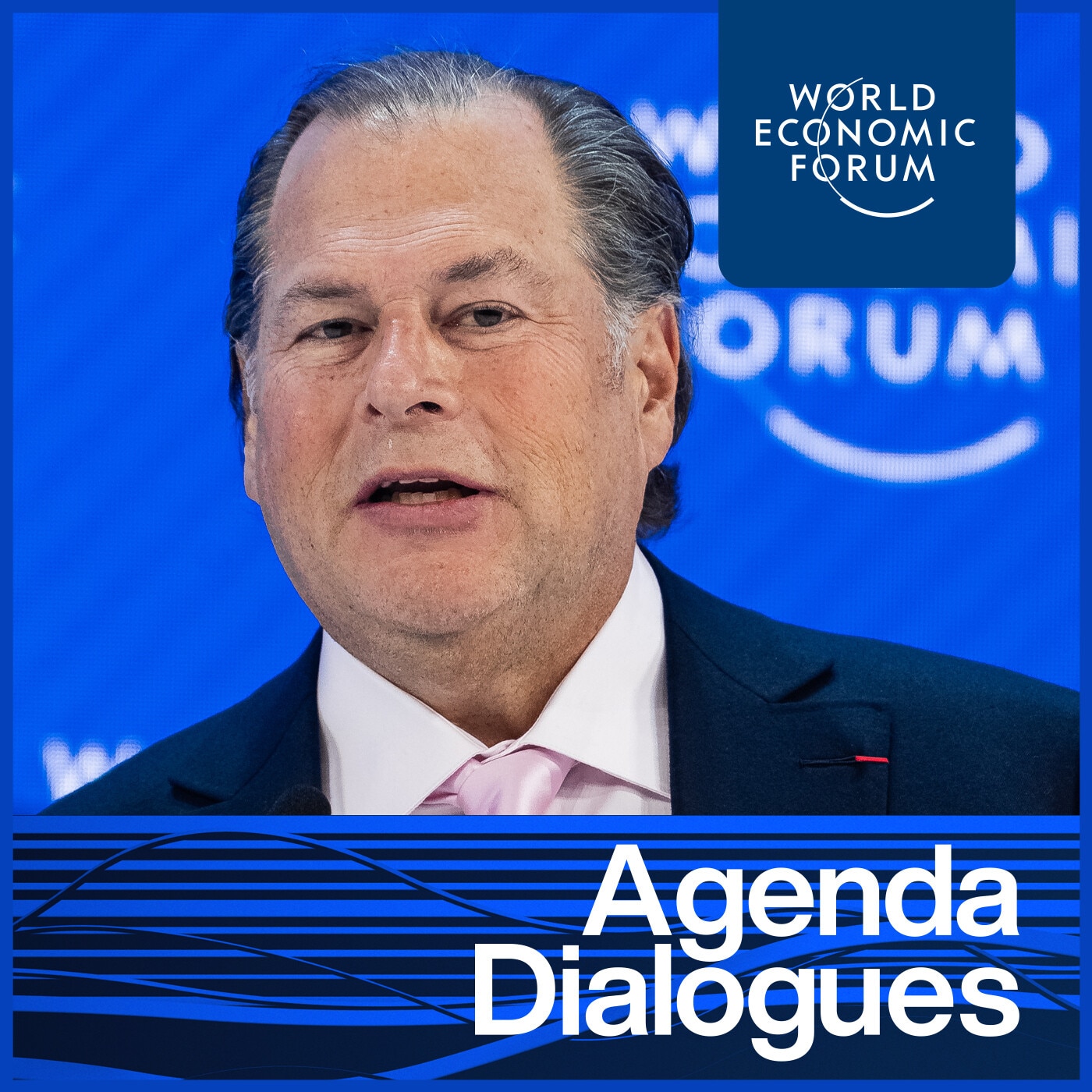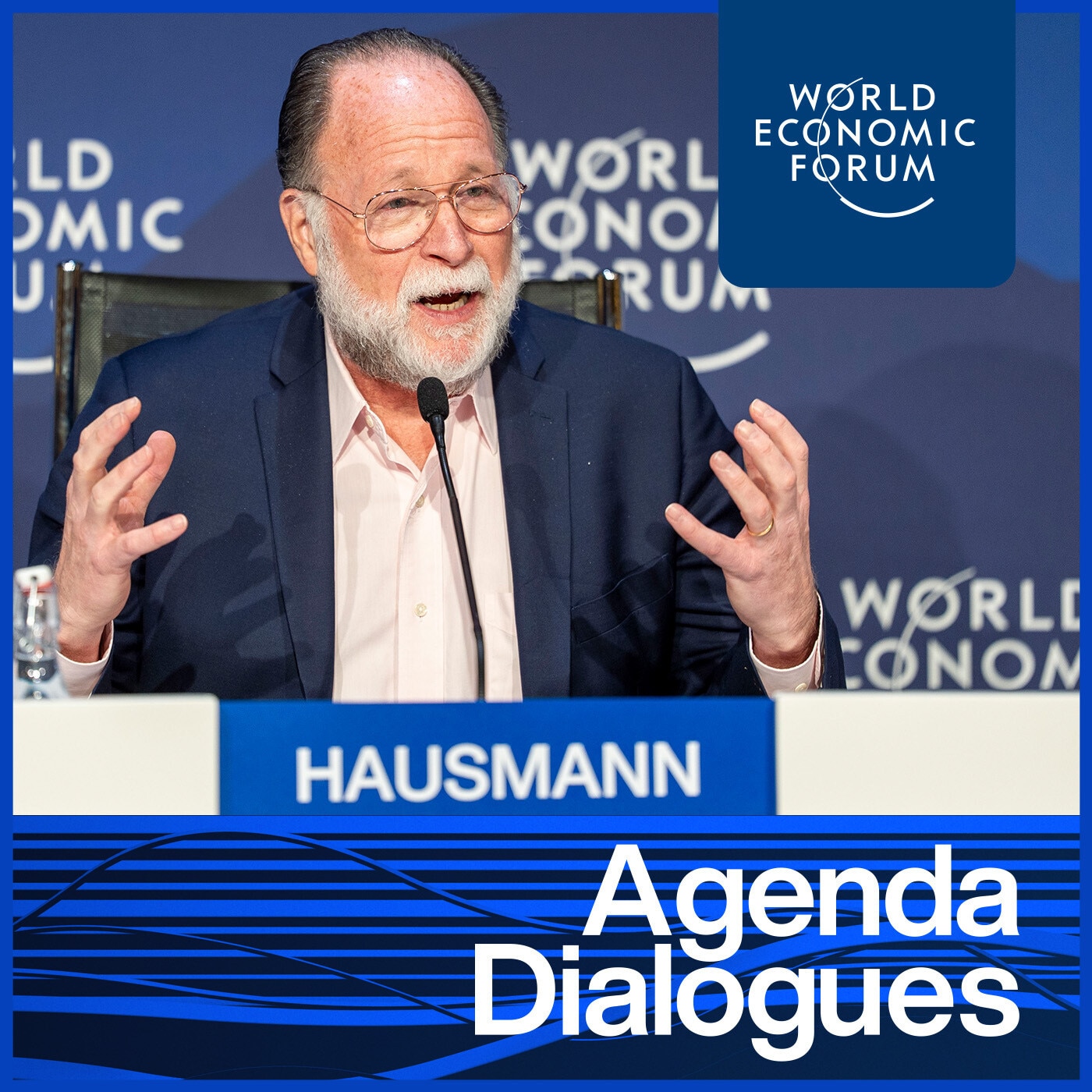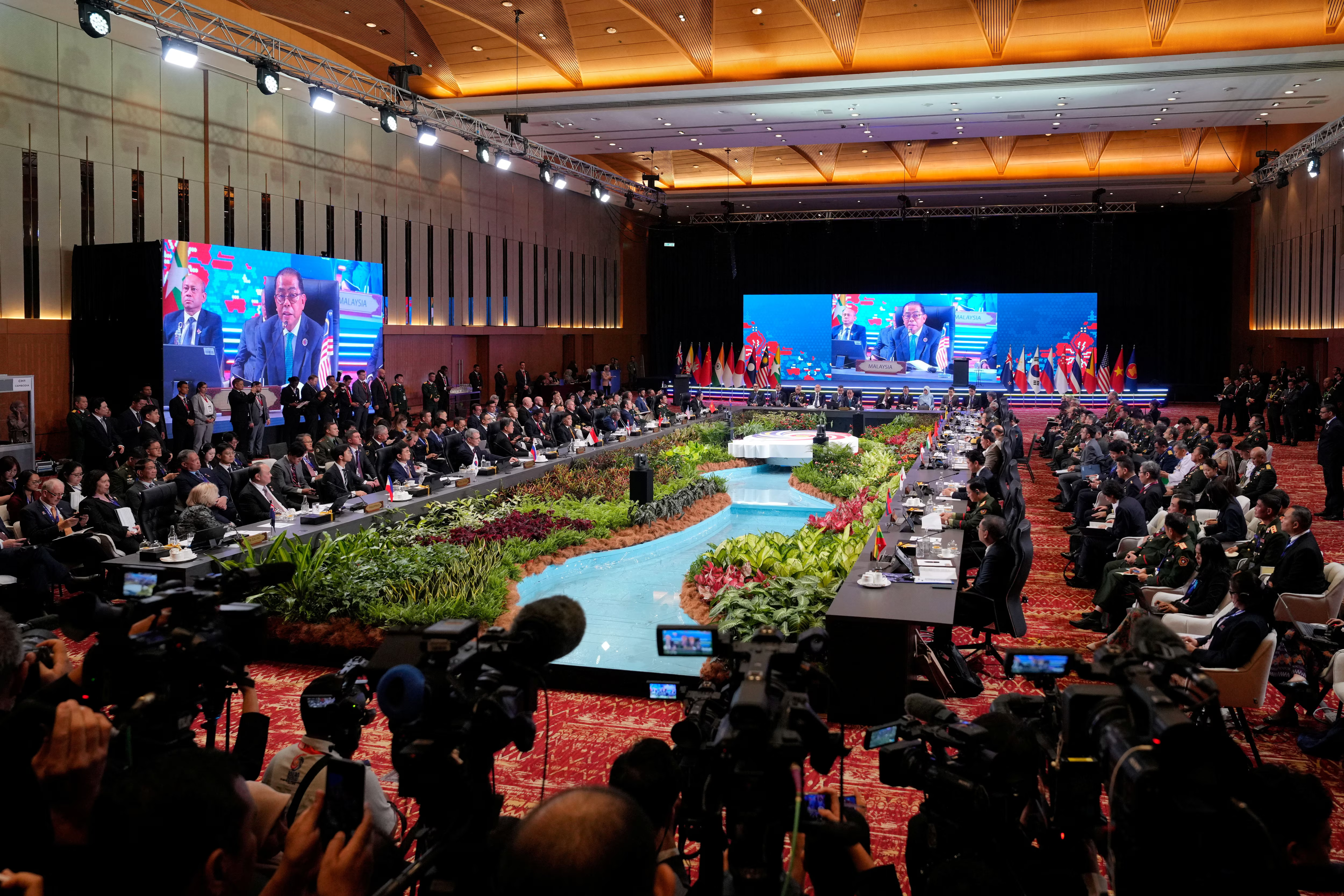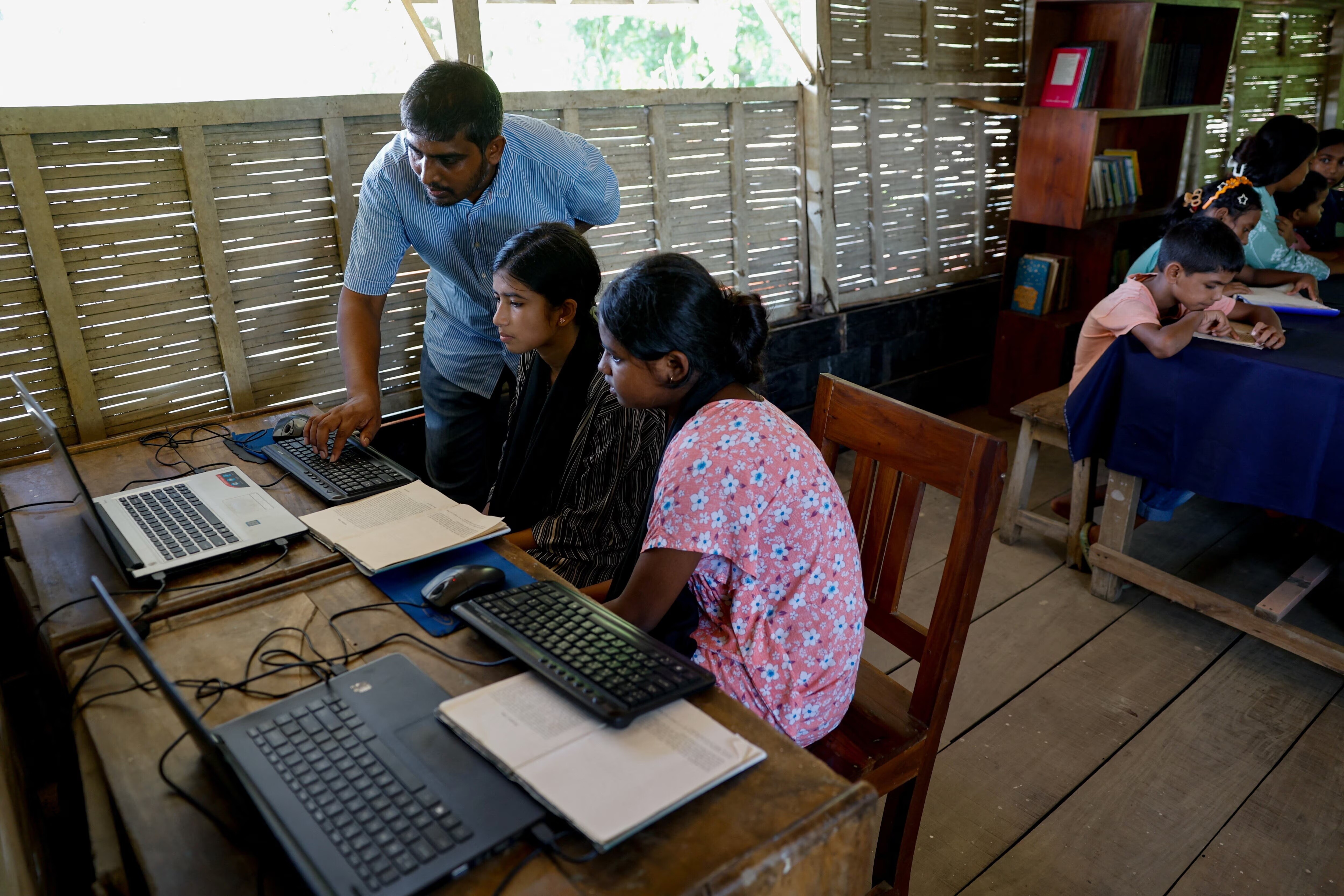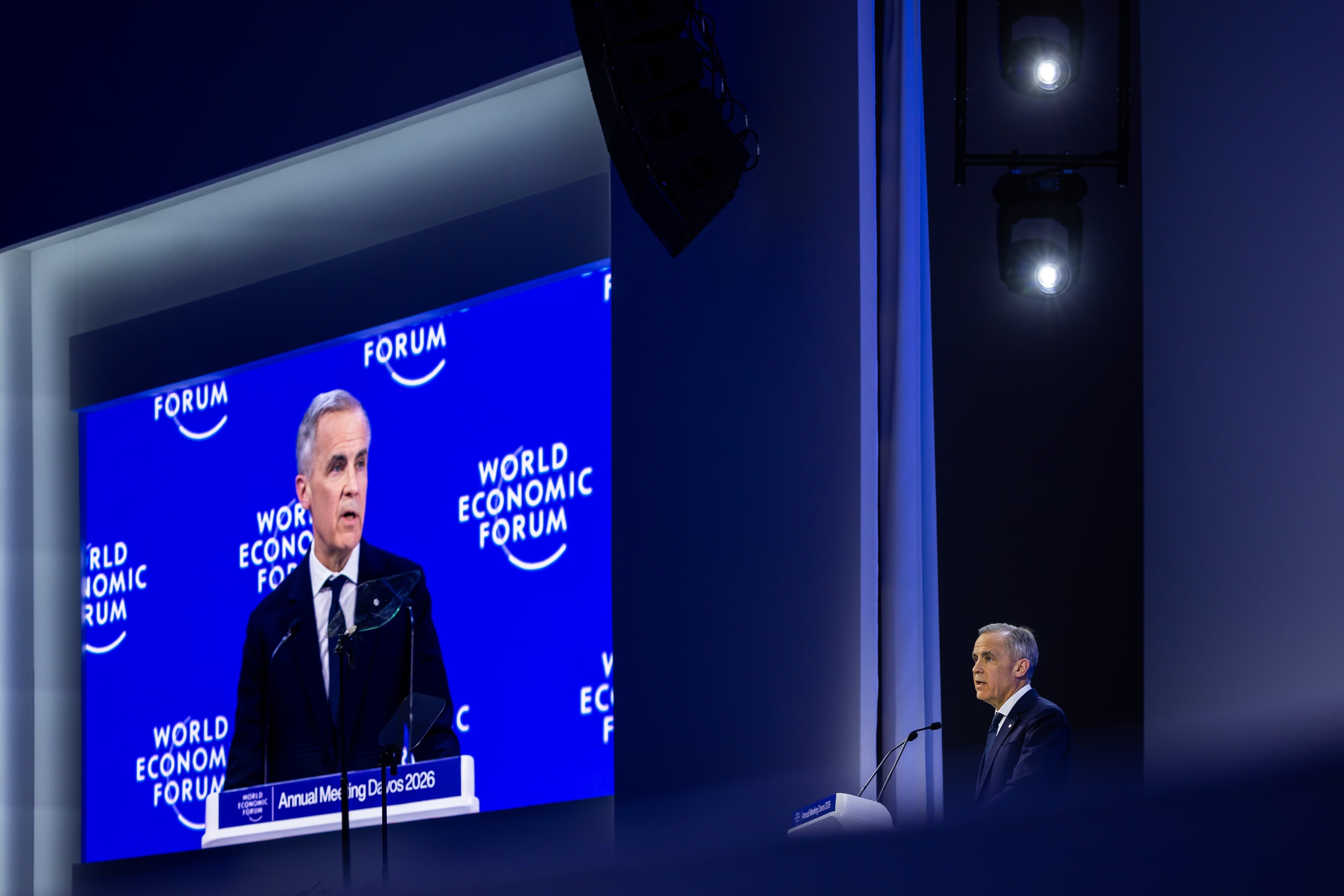Davos 2023: Global Economic Outlook: Is this the End of an Era?
Transcripción del podcast
This transcript, generated from speech recognition technology, has been edited for web readers, condensed for clarity, and may differ slightly from the audio.
Geoff Cutmore, Anchor, CNBC (session moderator): So a very warm welcome, everybody, to this World Economic Forum Global Outlook on the Economy that I'm my name is Jeff Cutmore. I do a programme on CNBC and I'm very grateful that the World Economic Forum has allowed me to moderate this very important panel that closes this key event this year. Now, just briefly, let me mention CNBC has interviewed through this last week over 90 CEOs and policymakers. We've been on various panels. I've been involved in a lot of those interviews myself. And probably the phrase that best describes the experience, I would say, of what I've taken away from this week is that investors and CEOs are increasingly bullish, but they are not optimistic. Now, that sounds like a bit of a contradiction in terms, doesn't it? But here to discuss whether they should be and how they should feel about the outlook from here, Kristalina Georgieva, the managing director of the IMF. Kristalina, thank you very much. Who this week warned the world that the economies of the world are increasingly heading towards fragmentation and action needs to be taken to stop that from happening. Bruno Le Maire, the French finance minister, thank you so much for being with us this week. Bruno Le Maire: said that tax credits and subsidies could help Europe counter competition from China and the United States, particularly around green technology. Joint debt, I believe he thinks, could be the answer to help meet the challenge of the Inflation Reduction Act in the United States. But we'll find out a little bit more about that as we go through the panel discussion. Christine Lagarde, “stay the course.” That has been the message from the ECB (European Central Bank) this week. And we're very pleased to have Christine with us to tell us a bit more about that and potentially what other challenges are out there for monetary policy in the eurozone. Haruhiko Kuroda. This morning, the Japanese inflation rate saw 4%, 4%. That is the highest since 1981. It's been quite a week for the Bank of Japan governor who has been in the midst of a battle with the bond markets over how he's managing yield curve control and monetary policy. And just to let you know, although I'm sure you are very aware, this will be probably his last Outlook Panel as the Bank of Japan governor. He leaves that position on April the eighth. Larry Summers. Larry Summers now in education, of course, but former Treasury Secretary. Larry Summers, I think, is starting to feel that there is a possibility that we might get something that looks a little bit like a soft landing in the United States. He also, I think, has a view on China. It would be a staggering error, I think, Larry, you've said for the US to try and suppress Chinese growth. So, I hope that gives you a little insight on how our key panellists feel about some core issues. Very briefly, as we gather for this first winter Davos in three years, there's still a great deal of uncertainty about the economic outlook as we know. Growth has lost momentum. Inflation is resiliently and persistently high. The cost-of-living crisis is generating poverty and labour strife. Central banks are tightening financial conditions. Energy prices remain high. Global debt is high and in some places is still rising. And I haven't even talked about Ukraine and the horrible crisis in Ukraine, the humanitarian crisis taking place there, or really the state of the energy transition, which we might also need to get on to here. And so, Kristalina, should our audience be pessimistic or optimistic about the year ahead?
Kristalina Georgieva, Managing Director, International Monetary Fund: Well, stay put. My message is it is less bad than we feared a couple of months ago, but less bad doesn't quite yet mean good. Let me start from what has improved and why we have to be cautious. What has improved is: inflation seems to have started leading in the right direction, in other words, down. Headline inflation, in particular. What has improved is the prospect for China to boost growth. Let's remember last year, 22, China registered for the first time in 40 years lower grade rate growth rate than the global average. Never happened in four decades. Now, with the reopening of China, we expect growth this year to again exceed global average. We project 2.7% for the world. This may be corrected somewhat in a couple of days. For China, we project 4.4%. And also, what has changed in the positive is that we have seen demonstrably strength of labour markets translating into consumers spending and keeping the economy up. Why we should be cautious? Well, first, 2.7, if this is the growth we achieve, by far is not fabulous. This is the third lowest growth rate in the last decades after the global financial crisis and COVID. It's not great. Second, we don't know quite yet how inflation would march downwards. What if the good news of China growing faster translates into oil and gas prices jumping up, putting pressure on inflation. And three: the horrible war in Ukraine is a risk for primarily the people of Ukraine, but it is also a tremendous risk for confidence, especially in Europe. So, conclusion: be careful not to get on the other side of the spectrum from being too pessimistic to being too optimistic. Stay in the middle of realism that seems to serve the world well. And if I may finish on the issue of fragmentation, we would, if we look at the medium-term growth prospects, how we handle security of supply chains would matter tremendously on our future prospects of growth. If we diversify rationally, the cost of this adjustment would be low. We put it down to 0.2% of GDP. If we are like an elephant in a china shop and we trash trade that has been an engine for growth for so many decades, the costs can go up to 7%, loss of GDP, $7 trillion. So, a great deal of whether we can lift the optimism depends on the people in this room. Be pragmatic, collaborate, do the right thing, keep the global economy integrated for the benefit of all of us.
Geoff Cutmore: Just to give you a little insight into what happens inside the speaker's room ahead of this, there was a relatively healthy discussion going on as to the semantics of when a “we are not going to downgrade further” translates into a “we may be more optimistic and we may be going to upgrade soon.” And I don't think you attempted on to the turf that Larry Summers was trying to bring you on, which was at what point do you start thinking, at the IMF, about upgrading rather than saying we are not downgrading?
Kristalina Georgieva: Well, we look at the last year, we have downgraded our projections three times. So not downgrading is already good news. Whether we would upgrade and if we do so, how much we will see in ten days. But I can tell you it is not going to be a dramatic improvement vis-a-vis what I'm projecting right now, the 2.7%. And let's be very honest, whether Germany finishes 2023 with -0.3%, which was our October projection, or they finish with plus 0.5%, which may be our new- the projection may go up to that level, still for hundreds of millions of people in Germany, all over Europe, in the world, when we are at this low level of growth, it would be painful. And let me send the biggest caution I could today. Labour markets are holding firm so far, but interest rates are yet to bite and if they bite more severely, then we can see unemployment going up. And it is very different for a consumer to have cost of living crisis and a job than to have cost of living crisis and no job. So, we have to be thinking of possibly unemployment going up at a time when fiscal space in governments is very tight. There isn't that much they can do to help people, and yet they would be pressed to do it. Christine, then all the power to you. If fiscal policy works against purpose with monetary policy, then you may have to tighten even further.
Geoff Cutmore: Larry Summers, I want to talk very quickly about the American economy, given it has been the engine that's picked up as China has been in zero COVID, and we always used to say, you know, America sets the interest rate, China determines the growth rate. But in recent years, that's not been quite so obvious. But undeservedly, I'm sure, you got a reputation for being a bit of an economic grouch, I think, since secular stagnation. And then, of course, last year you were talking a lot about how we're going to have high unemployment and we're heading into recession. But as I read your commentary more recently, sounds like you might be coming round to the idea that maybe a soft landing could be somewhat achievable. So, team transitory get the causes of inflation right, it just got the timing wrong. What do you think?
Lawrence H. Summers, Charles W. Eliot University Professor, Harvard Kennedy School of Government: I don't think team transitory got it right. I think there were very substantial excesses of both fiscal and monetary policy, which needed to be corrected. Markets assigned a probability of less than 1% to the interest rate increase as we've seen over the last year, a year ago. And that was because they underestimated the need for central banks to catch up, which central banks have done. We're experiencing some exhilaration of relief in Davos. Hyper populists lost elections and accepted their defeat. Europe has not frozen. Recession has not come. China has adjusted its policies towards the world and inflation has decelerated. Those are all positive things and reasons why we should feel better than we felt a few months ago. But relief must not become complacency. Inflation is down. But just as transitory factors elevated inflation earlier, transitory factors have contributed to the declines that we have seen in inflation. And as in many journeys, the last part of the journey is often the hardest. And that's true with respect to a return to the inflation target. The greatest tragedy in this moment would be if central banks were to lurch away from a focus on assuring price stability prematurely. And we were to have to fight this battle twice. I've been encouraged by the things that I've heard Madame Lagarde say, that I have heard Chairman Powell, say about their determination. I've been encouraged by what I have heard Governor Kuroda say in quite different context. But we have to carry through, because if inflation were to be allowed to surge back, that would put not just price stability, not just standards of living for some of the lowest income people at risk, but also pose very substantial risks to cyclical stability. At the same time, we need to remember both within our countries and around the world the importance of those who have been left behind and who are bearing the greatest burden from all of these necessary adjustments. And that, too, is going to be crucial in the years ahead. And I would pick up on something that I think Kristalina said that I think is very important as she warned against fragmentation. And I think Davos is a particularly important place to make the point that I'm about to make. Global integration must never be a primary cause of local disintegration. If that global integration is going to continue with all of the benefits that it can bring, that implicates every policy issue from the treatment of the debts of many countries facing substantial debt overhangs, to the challenges in the smaller cities and rural areas of all our industrial countries if people are to feel part of a successful community. I believe there is great positive potential in this moment. I've been doing this for many years and there has never been a moment where I have been so impressed by the potential of technology, whether it is green technology, biotechnology, artificial intelligence and information technology, to make things better for all the world's people. But that will only happen with the right kind of political and financial foundation.
Geoff Cutmore: Since you've said that, let me go to this straight away, because I know at least Bruno Le Maire: will have a view on this. It was said on our set, I think in one of the interviews, if we're going to have a trade war over anything, let's have a trade war over green transition technology, because if it's going to stimulate the brightest and the best in a race for new technology that helps the transition, then that's not a bad thing. But nobody actually wants a trade war. How do we get through this row going on between Europe and the United States over the Inflation Reduction Act?
Lawrence H. Summers: Well, I would I would respectfully I would distinguish between a subsidy war and a trade war. A subsidy war about very good things is basically a good thing. Walling off each other's innovation is basically a much more problematic thing. And so, yes, I would like to keep markets open. And I think that is hugely important. I think in its totality, the Inflation Reduction Act in the United States is a historically positive measure in its detail, I think there are certainly, and I would be in the direction of Bruno, problematic aspects. But look, if we are all competing over who can accelerate a transition towards renewables more rapidly, who can be the biggest leader in storage and transmission technologies, that is a very healthy kind of competition relative to all the kinds of competition the world has seen. So, yes, let's compete on that, but let's compete by how hard we try and how much we subsidise, not by how we wall off others or try to take down others. We need to win in a positive-sum way by building ourselves up rather than by seeking to tear others down. And if we can do that, I do think there's enormous potential in this moment.
Geoff Cutmore: We'll cycle back to this in just a moment, Minister, if you don't mind, because I think perhaps the one huge macro story of last year that we need to also talk about here is the reopening of China. So, I'd like to bring that into the discussion and we'll come back to the issue of IRA in just a moment. And Christine Lagarde, if I might bring you in on this, because, look, I know you are determined to tackle inflation in Europe. This week you have again stressed your desire to do that. But can I ask you, how does the reopening of the Chinese economy at this stage complicate the ECB's analysis of the inflationary headwinds that may emerge? Are you modelling for this already? And if so, what are you coming up with in terms of conclusions about whether there may be a secondary impulse from China's reopening on the inflation front and how that may extend how long you need to keep rates rising?
Christine Lagarde: Thank you so much. And good morning to all of you. I would like to, first of all, make a small observation. The situation around the world must be improving a little bit if you hear so many competent, talented economists say not as bad as feared or not so bad, maybe not yet good, but improvement. Added to which, you know, our economies and key players are moving from defence mode, which they had been collectively sometimes in 21 and certainly in 22 to competition mode, as Larry indicated. So, something must be getting better and certainly better than what we feared initially. 22 was just a weird, weird year when you look at it: inelasticity of supply, no real big engine for growth. If you look at the GDP numbers, it's totally, you know, counterintuitive. Growth in the United States, 1.9% growth in China, 3.3% growth in Europe, 3.4%. Those are not your usual numbers. This is not the normal ranking that you have. So, we are now heading to a year where hopefully the corporates, the consumers, the state policymakers will continue to have that resilient, determined approach in order to engineer the transitions that must take place, whether it's digital, whether it is green, whether it is inclusive in order to make sure that the most fragile countries in the world benefit from those innovations, as Larry referred to. But we have to also stay that course of resilience that we observed in 22. So stay the course is my mantra for monetary policy purposes. No question about that. But I think other players must also do the same thing and they must do it in probably a more subtle way than they had in 22. The fiscal support that was expended in 22, for instance, must be better directed, better targeted, must be made such that it is not going to push the monetary policy actors to having to do a bit more, as Kristalina earlier on alluded to. So, in all that, China is waking up again. After, you know, being assessed to be 3.3 percentage growth. It is now forecasting 5.5% growth and we should welcome the auspices of those commitments. And it is a case that the COVID policy, the change of this COVID policy, will kill a lot of people, but will also revive the economy and that's clearly a determined choice that was made by the Chinese authorities. What impact it will have on all of us in terms of added demand addressed to the global economy is something that will be a positive for China, most likely, will be a positive for the rest of the world, but will have inflationary pressure on many of us simply because the level of energy that was consumed by China last year was certainly less than what they will consume this year. The amount of LNG that they will be buying from the rest of the world will be higher than what we have seen. And there is not so much spare capacity in terms of both oil and gas so that we will have complete elasticity in there. So, there will be constraints, there will be more inflationary pressure coming out of that added demand in commodities and energy in particular. And yes, we do try to model all that. I think that the economist profession has been put under huge pressure, whichever team they belong to, because there are lots of things that models try to do, but modelling uncertainty and taking into account certain factors that have simply never happened in the polycrisis environment that we faced was tough. I think our honour is to acknowledge that and to try to do a better job in the future.
Geoff Cutmore: Just refocusing back in Europe, is there a chance that Euro Dollar back at 120 could persuade some members of the Governing Council perhaps to temper their rate outlook or adjust their rate outlook?
Christine Lagarde: I didn't see 120 this morning.
Geoff Cutmore: Oh no, we're not there yet. But I mean, the trend, if the trend is really your friend, then maybe we are going to see a stronger euro, which would ease some of the inflationary pressure perhaps.
Christine Lagarde: But that's an economic mechanical impact that we all know about. The central bank does not target an exchange rate. And obviously we take into account in our measurements and in the impact that it has on inflation, the variation of currencies.
Geoff Cutmore: Well, it was worth a try.
Christine Lagarde: That was a perfect politically correct answer.
Geoff Cutmore: Kurodasan. Let me be very blunt here, as the bond market has been very blunt with you, I think, since December. Was it a mistake to widen the trading band in your yield curve control programme? And what have you learned from the market reaction?
Kuroda Haruhiko, Governor, Bank of Japan: I don't think the decision taken by the board last month was wrong. Perfectly right. And we will continue the current extremely accommodative expansionary monetary policy in order to achieve a 2% inflation target in a sustainable and stable manner. But let me point out a few things. First, the Japanese economy is recovering from the pandemic and probably in fiscal year 2022, the Japanese economy has grown by about 2% and for fiscal 2023, again, the economy is likely to grow close to 2%. Since Japan's potential growth rate is about 1% or less than 1%, two consecutive years of 2% or close to 2% growth, is well above potential growth rate and means that the GDP gap is closing and the labour market is becoming tight and we expect wages to accelerate, to grow. That will eventually make 2% inflation target met with sustainable and stable manner. But second point, as you said, the inflation rate in last December reached 4%, highest in the last 40 years, but largely caused by import price hike. And we expect probably from February this year, inflation rates start to decline and fiscal year 2023 as a whole, inflation rate would be less than 2%. So, we decided to maintain the current extremely accommodative monetary policy for the time being. Our hope is that wages start to rise and that could make 2% inflation target be met in a stable and sustainable manner. But we have to wait for some time. Third point, as prior speakers argued, certainty the digital transformation and green transformation, these two aspects of structural changes would hopefully raise the potential growth rate in coming years while achieving necessary socially responsible attitude toward climate change risk. And already the Japanese government indicated that the government would facilitate providing substantial subsidies as well as tax breaks to increase this investment, including investment in human capital and also decarbonisation in investment. Actually, the government estimate that even in Japan alone, such a green transformation investment would amount to more than $1 trillion in the next ten years, which is huge. And that would require, of course, scientific as well as various progress, but I'm quite sure that in these two aspects the Japanese economy can grow, hopefully with 1 to 2% in the next couple of years.
Geoff Cutmore: As you leave your post, I guess it will be custom — I don't know whether it's custom in Japan — but it's custom in many offices in Europe that you leave a letter for the next person who takes the job. I wonder if you leave a letter for the next person that takes the job, will you perhaps express regret that you didn't take the opportunity to escape from these very loose monetary conditions and yield curve control several years ago, when perhaps you had a window?
Kuroda Haruhiko: I think in the last nearly ten years, during which I have been Governor of the Bank of Japan, we tried to eradicate deflation. And that certainly we have been successful in eradicating deflation. And we try to recover economic growth because during the deflationary period from 1998 through 2012, there are also almost zero growth. But after 2013, economic growth has been regained, but about 1%. So also, I must say that huge number of new employment have been increased, have been made, and that, was mainly due to increased labour participation of women. And that was quite, quite successful. So all in all, I think the government policy, coupled with Bank of Japan's extremely accommodative monetary policy, has been successful in changing the Japanese economic structure and the growth prospects. But unfortunately, a 2% inflation target has not been achieved in a sustainable and a stable manner. As I said, the 4% inflation right now is largely caused by import price hike and it will start to decline to less than 2% in this fiscal year. So that is the only regret I have.
Geoff Cutmore: Bruno Le Maire. Ukraine, for very clear reasons, has united Europe like no other issue could or has, I think in recent years. But on budget rules, on state aid, rules on the right response to the Inflation Reduction Act, not so much. I think we see differences at the moment. Does Europe actually need another EU fund to match the $370 billion that President Biden is going to inject through the Inflation Reduction Act? And if you believe that is one of the tools to respond, how do you get that approved at a European level?
Bruno Le Maire: I think that, first of all, we should be aware of what has happened over the last three years. The last time we met in this wonderful conference room, thanks to our friend Klaus it was in 2020. And over the last three years, we have experienced the COVID, the lockdown, the recession in every developing or developed countries. The rise of inflation and the war in Ukraine. And yet we are still here. We are back discussing over the future of the world and what the best solutions for the world. That's the first good news. The second good news is that Europe, over the last three years, has become a super political power like China and like the United States. That's good news for all of us to have a continent like Europe being able to defend its values, to defend its interests. Putin thought we would be divided. And we would be weak. We have been united and we have been strong and we will remain united and we will remain strong vis-a-vis Putin and vis-a-vis the war in Ukraine. That’s a very good news. Nevertheless, we should be aware that over the last three years, we have entered a new era of globalisation. We have shifted from a market-driven globalisation. To a politically power-driven globalisation. And we have to draw all the consequences of that. We have to avoid the worst-case scenario. No fragmentation, but more cooperation. No trade war, as Larry said, but just a fair competition. Competition is a good thing for all of us. No new war, but engagement of all countries, including China. China, cannot be out. China must be in. And you know that this is a difference of view that we have between the US and Europe. We don't want to oppose China. We want to engage China and we want China to abide by the same rules, to abide by the same rules on intellectual property, on a level playing field, on the access to markets. This is our policy, and that's a good thing that we can have different views. As far as your question is concerned. Inflation Reduction Act. I think that we need to have a global approach. That's a good thing that the United States of President Biden has decided to invest in the green industry and have decided to accelerate the fight against climate change and Europe must do the same thing. But if we want to compete, we need to have a very strong, effective, efficient, swift European industrial policy based on three key pillars. The first one is acceleration. Private companies, industrial companies cannot wait two or three years before getting their subsidies that we promised to them. Dear project of common interests to so-called [inaudible] a very good thing. And I really think that this is a breakthrough in European policy. But two or three years is too long, we have to act swiftly and we want to reduce the delay from two or three years to six months before giving the subsidies that are required by the industry. The second key pillar must be simplification. The European process remains too tricky and too complicated for the economic actors. We need to go the way of simplification that has been underlined by President Ursula von der Leyen. That is right. We need to simplify the European process. And a third point is to focus on very specific sectors. The question is, where do we want to spend our European money? Do we want to buy? Foreign goods? Foreign devices? Foreign electric car batteries? Or do we want to put the money in investments? With President Macron, we are fully convinced that there is a need to invest more in hydrogen, in semiconductors, in solar panels, in nuclear energy, in renewable energies, with the view of being more independent and with the view of better fighting against climate change while mixing growth and the fight against climate change. The key for that is the decarbonisation of the economy. Decarbonisation of the economy is the biggest challenge that we have to face, which will help us to reconcilliate growth and climate.
Geoff Cutmore: I think everybody in the room was along for the ride until you started talking about foreign products. And then I think people went, oh, okay, this is a made in Europe, Europe-first agenda. So, I'm thinking now, do I need to stock up on my French cheeses and buy my American motorcycles? Because when you start talking that kind of language, it sounds a lot like America first. If you're talking Europe first.
Bruno Le Maire: I will respond to you very bluntly.
Geoff Cutmore: I mean is this protectionism we're talking about?
Bruno Le Maire: No protectionism. I'm not talking about protectionism. I'm talking about preserving and defending the economic interests. But let's be very clear. The key question is not China first or United States first or Europe first. The key question for all of us and for all the nations in the world is climate first. And if we want to have climate first, we need to invest more in the fight against climate change. We need to invest more in the green industry. We need to have our own chips being produced in Europe. And our strategic goal is very clear. We want to come from 9% of the semiconductors produced in Europe to 20%. And this is absolutely compatible with the determination of the US to have more semiconductors and more chips being produced in the US. And that's perfectly compatible with the ambition of China to get also access to semiconductors. There is a place for all of us in the fight against climate change and in the decarbonisation of the economies.
Geoff Cutmore: We have just about 13 minutes left here. Polycrisis is, I think, the word that the Forum itself has conjured up to talk about the multiple challenges that we face and we've talked at a high level here. But as I look at the rioting in France, the industrial action in the UK, the cost of living crisis around the emerging world, it is clear that there is a community out there who believes that there is a lack of urgency in the resolution of the personal crisis that they're facing, and they want leaders to step up and they want leadership, and they also want to be informed about what the potential at the moment unforeseen risks could be in 2023. Given nobody had Putin launching a war or the spike in energy price related inflation priced in for 2022. So, as we look at 2023, if I could ask each of you perhaps just to give us a little bit of a heads up as to what else we need to be worried about for the year ahead and what else we need to protect ourselves against this year. Kristalina.
Kristalina Georgieva: My biggest concern is that something that in principle is very good to accelerate the transition to the green economy by using public money to step up private investments — this is what the US is doing, this is what we just heard from Bruno Europe is doing — may not serve well the emerging markets in the developing world. Why? Because if you take technologies to emerging markets, if technology transfer is part of your plan, yes, we will succeed. But if we are to strive to get the industrialised world clean and we don't think about the emerging markets, we are all cooked. We all studied, many of us studied business, tnd there is a famous story. Two men in the forest chased by a bear. One of them runs. The second one pulls sneakers from his backpack. First one says, do you think that with sneakers you would run faster than the bear? Second one says, I don't want to run faster than the bear. I want to run faster than you. Our problem is that for the climate crisis, we all need sneakers. And I would I would challenge Europe to lead the way in using their power to accelerate the green transition in the developing world.
Geoff Cutmore: Thank you.
Kristalina Georgieva: Sneakers for everyone.
Geoff Cutmore: Larry Summers.
Lawrence H. Summers: Kristalina is 100% correct on the centrality of facilitating the flow of capital from the developed world to the developing world in support of climate transition as the single most important long term global financial issue facing the planet. It demands much more imagination, much more boldness than, frankly, we have yet seen from the international institutions or from the governments who control them. In terms of near-term risks, I would highlight a resurgence of inflation because of a loss of credibility. I would highlight what nobody has talked about, the possibility that the virus evolves again, and I would note that the odds, in my view, are better than 50/50, that there will be a COVID-scale problem within the next 15 years and that the world is utterly unprepared for that eventuality.
Geoff Cutmore: Okay.
Lawrence H. Summers: I would stress that there is a lot of debt in a lot of places and that if it proves necessary for interest rates to rise more than is currently anticipated, there may well be a need for financial firefighting domestically and globally. And I would finally highlight that economics proposes and that politics disposes. And I would point to the geopolitical risks in Asia and in the Middle East as a potential destabilising wild card. And while the last several outcomes have been positive, on elections, I would highlight the danger of hyper populism.
Geoff Cutmore: Thank you very much, Larry Summers. We've only got about 5 to 7 minutes left, I think here. So please, I want to get everybody in. How did he go, Kuroda?
Kuroda Haruhiko: Thank you. I shall be very brief about the Asian economies. As you know, the Chinese economy is likely to grow by 5% this year, accelerating from 3% growth last year. Southeast Asian economies are, generally speaking, doing fairly well. On the other hand, South and West Asian economies, except for India, which is doing exceedingly well, are faced with a difficult situation. As you know, Sri Lanka, as well as Pakistan are in kind of economic crisis, debt crisis. And even Bangladesh, which had been doing quite well, is faced with balance of payment difficulty and so on, so forth. So I think, of course, climate change assistance is necessary in the long run, but for the time being, I think those South and West Asian economies must be helped by IMF and other bilateral donors.
Geoff Cutmore: Okay, Thank you. Christine Lagarde.
Christine Lagarde: Well, thank you very much. The first thing that I hope will not happen in 23 is that fiscal policy in Europe will work in, you know, countercyclical way vis-a-vis monetary policy. We will do what is necessary. We do not need to be pushed to having to do more than is necessary. So good understanding of what will help and what will hinder, I think, will be essential. Second observation, which is a little bit outside the monetary policy strict field. You know, there is so much to do to fight climate change and protect biodiversity. There are so many people that are on the verge of falling back into poverty or falling into poverty that there is plenty of activity for all to be had around the world. And I hope very much that this subsidy race that we are hearing about is not going to be a race for the bottom on the hotel of climate change fight and biodiversity protection, as well as inclusion of people out of the poverty where they are at risk of falling. Because if that was the case, there's good business to be had for the WTO. Remember Airbus, Boeing, 20 years of subsidy wars, well the WTO is in business. They will continue to have to argue the case of one against the other. We shouldn't do that. We have to cooperate as advocated by Bruno.
Geoff Cutmore: Bruno Le Maire.
Bruno Le Maire: I would say that my deepest concern is clearly the war in Ukraine. For three clear reasons. The first one is that. As a European citizen, I cannot live peacefully. Knowing that European citizen, every day on the European soil are being threatened, targeted by bombs, injured or killed. We need a ceasefire and we need to put that war to an end. The second reason, yes, there is a risk of extension of that conflict. Let's be very clear and at some point, Vladimir Putin might be tempted by the extension of the conflict. And the third reason, and this is really important that we open the discussion here in Davos about that question, the war in Ukraine is not a regional conflict. I know that many nations around the world think that this is only a regional conflict. This is not a regional conflict. This is a global conflict. This is a global conflict because it has a direct impact on the level of prices, on the level of commodity prices, on the level of energy prices. This is a global conflict because our core common values are at stake. There are at stake, and the principle of sovereignty, of national sovereignty, must never be jeopardised, never be weakened by any kind of conflict.
Christine Lagarde: Jeff, can I add a follow up to Bruno?
Geoff Cutmore: Because it's you, of course.
Christine Lagarde: He makes such a strong point, but it has to be supported but something by something that has been extraordinary in the last 12 years, and that is the solidarity between the United States, the Europeans and quite a few other countries, including Japan. If that was to break down because of domestic imperatives, because of political considerations back at home, we would be in a pickle. And we really have to make sure that that solidarity front holds and we Europeans can demonstrate that. When we have Brexit, we are all together, we will carry on. But I think we have to make sure that it sticks.
Geoff Cutmore: Gosh, I hoped I would never hear that word again. Actually, I thought we'd buries that one.
Kristalina Georgieva: Can I be aggressive here and use the fact that you made an exception to say one thing, to support Bruno. It is a global war, because what it did is it wiped out the peace dividend we have enjoyed for 30 years gone. What is the result? Money that could have gone to invest in development is now going to invest in military and rightly so. Rightly so, to defend to defend all of us from an aggression. The result? More poor people, more hunger. So, yes, it is a global war. It is a war against prosperity around the world.
Geoff Cutmore: And Kristalina, and I think as someone who understands the Iron Curtain and what happened behind the Iron Curtain, those words have even more power. Look, we're going to wrap up here. I would like you to thank our panellists in the traditional fashion, but I'd also like you to stay, because the president of the World Economic Forum, Børge Brende, is going to join us on the stage and do the formal wrap up. So don't go anywhere. But please thank our panellists.
The engines of global growth are slowing and the number of households and businesses facing economic distress is rising.
What does the future of growth look like and what policies are needed to stabilize the global economy?
This is the full audio of the session at the World Economic Forum's Annual Meeting 2023 that you can watch here: Davos 2023: Global Economic Outlook: Is this the End of an Era?
Speakers
Geoff Cutmore, Anchor, CNBC
Kristalina Georgieva, Managing Director, International Monetary Fund
Christine Lagarde, President, European Central Bank
Bruno Le Maire, Minister of Economy, Finance and the Recovery and Industrial and Digital Sovereignty of France, Ministry of Economy, Finance and Industrial and Digital Sovereignty
Kuroda Haruhiko, Governor, Bank of Japan
Lawrence H. Summers, Charles W. Eliot University Professor, Harvard Kennedy School of Government
Subscribe
Subscribe on any platform: https://pod.link/1574956552
Join the World Economic Forum Podcast Club
Follow all the action from the World Economic Forum’s Annual Meeting 2023 at wef.ch/wef23 and across social media using the hashtag #WEF23.
Más episodios:
La Agenda Semanal
Una actualización semanal de los temas más importantes de la agenda global
Más sobre Cooperación GlobalVer todo
Joo-Ok Lee
11 de febrero de 2026
